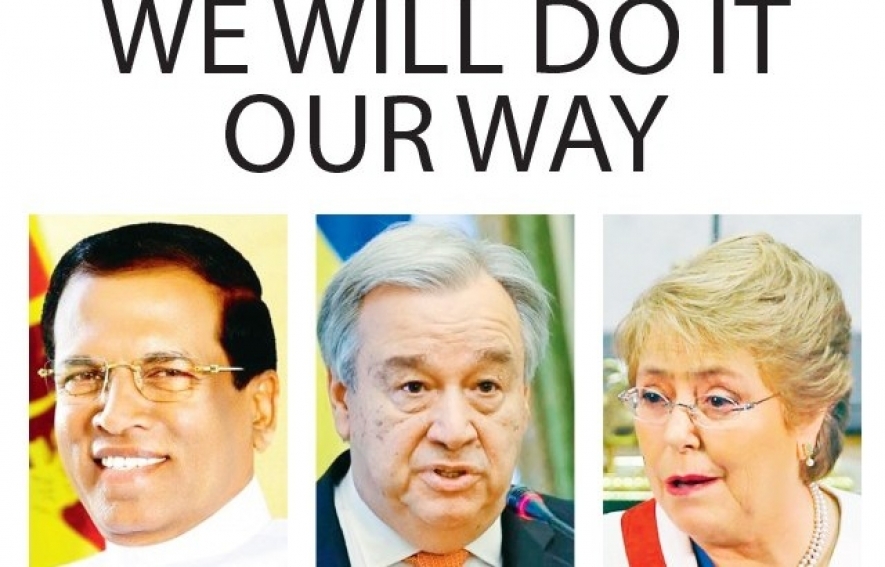At the 73rd Session of the United Nations General Assembly on 25 September, President Maithripala Sirisena will announce a set of new proposals for consideration at the March 2019 Session of the United Nations Human Rights Council (UNHRC). He will also submit these proposals to UN Secretary-General António Guterres, as well as UN High Commissioner for Human Rights, Michelle Bachelet. The President expects to meet both of them in New York, in two weeks time.
Addressing Media Heads at the President’s House in Colombo last Friday, President Sirisena said that he would discuss his new proposals with Bachelet.
After assuming duties, Bachelet, in her first address in Geneva said, “Good governance is based on identifying and amending gaps in access to justice, dignity, and equality, so that all can live in more respectful and harmonious societies, and enjoy development that is more dynamic and sustainable.”President Sirisena, in his media briefing last week, said the UN Human Rights High Commissioner’s recent statement on Sri Lanka was a balanced one.
Bachelet, a Chilian human rights activist, who was imprisoned during the dictatorial regime of President Pinochet, told the UNHRC about her deep commitment to human rights. In her speech, she briefly talked about Sri Lanka. “In Sri Lanka, although the authorities have moved too slowly towards meaningful implementation of the transitional justice agenda, the Office of Missing Persons has now begun consultations and institutional capacity-building to fulfil its mandate. We look to that Office to work quickly, to begin to provide answers to the families of the disappeared. Legislation establishing an Office for Reparations is also underway. More progress in advancing accountability and truth-seeking could have great weight in the long-term stability and prosperity of the Nation. Recurrent incidents of racist and inter-communal violence are disturbing, as are announced plans to resume use of the death penalty,” she said.
When a journalist pointed out that the new High Commissioner said the progress was slow in Sri Lanka, the President was quick to admit the process was slow, but steady. He pointed out that such vexed issues cannot be tackled quickly, as many sensitivities have to be balanced. In any country that faced prolonged conflicts, the solutions took a very long time, and Sri Lanka is no exception.
Pro-LTTE NGOs
President Sirisena further said that certain pro-LTTE non-governmental organizations (NGOs) are making various allegations regarding human rights violations. He stated that the Government was able to avoid Sri Lanka’s isolation in the UN Human Rights Council, which had prevailed before it came to power, and succeeded in fostering friendship.
The President said the proposals he will submit to the UN are aimed at solving issues and provide relief without causing harm to the pride of the security forces and safeguard independence, sovereignty, and national security. Furthermore, these proposals will facilitate harmonious solutions for remaining issues, with regard to alleged acts of both sides during the conflict.
“There is positive recognition for the Sri Lankan armed forces internationally, as a disciplined Army, and that is evident from the fact that United Nations Peacekeeping Forces recruit increased number of Army personnel from Sri Lanka,” he pointed out.
The President will lead Sri Lanka’s delegation to the 73rd United Nations General Assembly (UNGA) in New York. The 73rd UNGA will begin on 18 September at UN Headquarters, New York, while the General Debate will be held from 25 September to 1 October. The President will address the 73rd Session of the high-level General Debate of the UN General Assembly at UN Headquarters in New York on 25 September.
Sri Lanka’s decision to submit a fresh set of proposals this year is indeed a fulfilment of a long felt need. Last September, addressing the 72nd Session of the United Nations General Assembly in New York, President Sirisena emphasized the Government was tackling issues, while “we protect our independence and sovereignty.” He urged the international community to support “the slow, but steady forward march to achieve our targets in order to find sustainable solutions for the allegations levelled against us.” It was a very clear message to the West, that we will not implement any of the clauses that could infringe on our sovereignty. “Some extremist groups are expecting a high speed. Some extremist groups want radical solutions.
However, as a country that has faced a three decade long war, where deep divisions have existed, I request the support of all of you to promote peace and fraternity, so that my beloved country and its people can rise from the current situation. That is why I emphasize that it is for a slow and a successful journey that we need the support,” he said.
At the same time, he pointed out that, “as a government, we are paying serious attention to the aforementioned allegations, and to find solutions to them as a matter of priority. Mainly, my government has performed well in terms of strengthening democracy and protecting human rights. I must mention here that the Government will continue to ensure their progress in the future.”
Domestic issues
The 73rd UNGA is an important occasion for the President to brief the international community about Sri Lanka’s domestic issues, and the imperative need for local solutions for them. This time, he will be able to explain his proposals to the international community and gain its support.
Sri Lanka has been a member of the United Nations for 63 years. Sri Lanka has always been a country that has respected its treaties and conventions, agreements and rules and regulations, while acting to improve these relations further. Now, all that Sri Lanka is asking for is the support of the international community to continue on a slow, but steady path to find a lasting solution that will ensure communal harmony, as well as the unity, independence, sovereignty, and territorial integrity




















